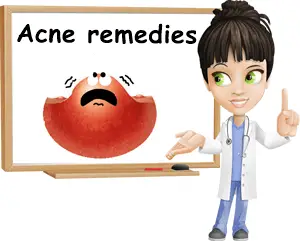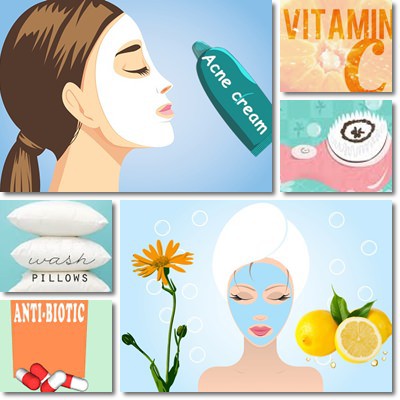Acne is a medical condition and a skin disease with a huge social impact. The more severe it is, the deeper the emotional stress it causes and the more likely it is for it to lower our self esteem and affect our relationships with friends, colleagues, family or other loved ones.
When it comes to acne, treatment alone is not the only solution for improving skin health and appearance. Measures to ensure good skin hygiene, respecting skin type and caring for it accordingly are just as important as traditional therapies for the best long-term results.
Acne treatment presupposes a multilateral approach to what is causing the condition and symptoms management.
Prevention and management of symptoms are just as important as medication and other traditional therapies recommended by expert dermatologists.
Because modern medicine has not yet identified what causes acne, the condition may prove difficult to address in its more severe stages, hence the importance of combining traditional treatments with alternative solutions and good hygiene for the best results in terms of skin health and skin care.

The six main aspects to consider when it comes to treating and managing acne are:
1) Taking the right medicines.
2) Treating scars, blemishes and other signs.
3) Maintaining a strict hygiene.
4) Eating right by avoiding problematic foods.
5) Taking our vitamins.
6) Enjoying the beneficial effects of natural treatments.
1) Acne medication
For the treatment of mild, moderate and severe forms of acne. Usually includes medicines such as benzoyl peroxide, retinoids (retinol, adapalene, isotretinoin, tretinoin, tazarotene), antibiotics (erythromycin, clindamycin, tetracylcine, sulfacetamide etc.), salicylic acid, hormonal therapy (iodium for thyroid problems, antiandrogens, birth control), azelaic acid as well as dietary supplements (zinc, a form of vitamin B3, vitamin C).
Benzoyl peroxide
Benzoyl peroxide is one of the most commonly prescribed topical treatments for mild and moderate acne. It can be found in gel or foam form and it owes it efficiency to its strong antibacterial properties, being particularly efficient against P. acnes, the bacterium that contributes to acne development.
Benzozyl peroxide has a whitening effect and may cause side effects such as increased risk of sunburns, irritation, redness or encourage the formation of free radicals.
Retinoids
Retinoids are basically different forms of vitamin A and, just like the original nutrient, they contribute to skin cell health by ensuring normal growth and differentiation, helping healthy skin cells take on various functions and characteristics.
Moreover, retinoids exert an antibacterial and antiseptic action.
Side effects may include photsensitivity, higher risk of sunburns, dry skin, redness and itchiness, blisters, excessive skin exfoliation of affected areas, pruritus, sensitivity, rarely acne breakouts and worsening of the condition, skin pigmentation.
Azelaic acid
Azelaic acid is used for treating both acne and rosacea and works by reducing the numbers of skin-inhabiting bacteria such as P. acnes, responsible for acne development, reducing inflammation, melanin production and thus hyperpigmentation and excess keratin, thus cutting off the food supply of certain bacteria. Salicylic acid is used in topical preparations for its antimicrobial properties. Both may cause side effects such as irritation.

While efficient, hormone therapy can generate serious side effects ranging from mood swings, fluid retention, weight gain, bloating, nausea to blood clotting and birth defects in newborn babies, being unsafe during pregnancy, in smokers and women with a higher risk for estrogen sensitive cancers.
Choosing the right medication for you depends on the type of acne you are dealing with, whether or not it causes scarring, your dermatologist’s expert advice, your reaction to the medication recommended, potential side effects, health risks you are willing to undertake etc.
2) Scar treatment
When acne progresses and becomes severe, it leads to scars of all sorts. Most acne scars are pink or reddish blemishes, but severe forms can destroy the skin itself with its fat reserves and collagen and leave more lasting marks, even indentations in the skin.
In time, the skin will repair itself, given it is properly cared for and nourished both from the inside and the outside. But stubborn scars can be dealt with in other ways too.
Redness and swelling can be reduced and treated with the help of cortisone creams and various skin lighteners. However, make sure you understands the side effects and health risks of every product you put on your skin. Anti-acne products of the sort can lead to pigmentation problems and even have carcinogenic effects.
Treatment of acne indented scars often consists of filling the scars or resorting to chemical peeling or laser treatment. It is best these procedures be done by a professional dermatologist to avoid unnecessary risks and complications that may compromise your expectations towards the effects of these treatments.
Acne scars in the form of indentations can be filled every 3-6 months to reduce their aspect. This procedure is temporary and does not help skin regenerate.
Laser treatments can stimulate the production of collagen in view of regenerating the parts of our skin affected by deep scarring. One type of such treatment can also level the skin surface (reducing scar intensity) in addition to stimulating collagen production for skin regeneration.
Lastly, chemical peelings make use of acids to peel off the most superficial layers of the skin. This forced, but controlled exfoliation is meant to encourage the skin to produce new cells to take the place of old ones affected by scarring.
3) Maintaining a strict hygiene
When it comes to preventing, managing and treating acne, it is crucial to develop a flawless hygiene. Consider the following aspects:
a) Use the right skin care products
People with dry skin should use products made especially for their skin type, just as people with mixed or oily skin should use products suited for their skin type. People with sensitive skin should consider using hypoallergenic skin care products.
b) Use gentle formulas
Harsh soaps, cleansing gels or foams or anything with strong perfumes and chemicals is not suited for acne-prone skin because it can contribute to flare-ups.
The best products are those with gentle formulas such as creamy face soaps, gel or foam face washes or cleansers with herbal extracts and no perfume, hypoallergenic, oil-free, perfume-free creams etc.
c) Exfoliate
No matter how bad my face was doing, I always found relief in exfoliation. I use either a gentle scrub, mostly plant-based, or plain sugar.
I gently rub my face for a couple of minutes to unclog my pores and rinse with water, pat dry with a clean, face-only towel and then apply a little face cream for moisturizing. I do this in the morning and in the evening before going to bed.
Keeping up this routine religiously has helped me avoid breakouts and flare-ups that have left me with deep scars in the past.
d) Moisturize
When we strip our face of its natural oils, it will compensate by producing more sebum so not using moisturizer can irritate the skin and encourage increased sebum production and acne.
e) Keep clean
Avoid touching your face or hair with your hands, clean or not. Wash hands frequently, especially before applying make-up. Clean make-up brushes and sponges every week with warm water and soap.
Discard make-up products as soon as they expire. Make-up is something personal so it is best it is not shared with anyone. Use a non-comedogenic, hypoallergenic, oil-free, alcohol-free foundation and mineral products.
Do not clog pores with too much make-up and remember to never go to bed without cleaning your face.
Change pillow cases once or twice a week. Always shower after exercising or if it’s too hot outside and you have been sweating excessively to unclog pores. Wash hair every other day.
As I’ve learnt from experience, hair accumulates quite a lot of dirt, dust, sweat etc. and leaves a lot of debris on our face, contributing to clogged pores and acne. This was also what caused the recurrent, deep-scarring acne along my jawline and cheeks.
After starting to wash my hair more often, I stopped getting acne in these areas of my face. Cleaning our phone or phone case with antibacterial wipes regularly can also help reduce acne because it’s one object we constantly keep to our face.
f) Don’t pick or squeeze
With acne, skin is already inflamed and highly sensitive, so squeezing or picking it can damage it severely, delay healing and lead to scarring.
g) Monitor sun exposure
Many acne treatments leave skin more sensitive to sun radiation, hence the likelihood of getting sunburns. Wearing a hat to protect the face and sunscreen is recommended.
4) Eating the right foods
Our skin needs nourishing both from the inside and from the outside. Just as certain foods are great for clearing acne, other may contribute to it.
The main foods to avoid for acne prone skin include dairy products, cold meats, excess animal fats, sweets, candy, baked goods and anything rich in refined sugars and hydrogenated fats, chocolate (not dark chocolate) etc.
A clear skin can be achieved by eating sufficient fresh fruits and freshly-cooked food. Anything we can cook from scratch from fresh ingredients (mushrooms and chicken legs or vegetable stew) is better for our skin that anything deep-fried, pre-ordered, ready to heat or defrost-only.
5) Taking your vitamins
Acne-prone skin benefits immensely from the therapeutic properties of several vitamins and minerals. Vitamin C is recommended to reduce inflammation and bacterial growth, while stimulating the immune system.
Moreover, because of its ability to increase collagen production in the skin, it is believed to help reduce acne scarring. Zinc preparations are recommended for their antimicrobial and immunity-boosting properties.
Nicotinamide derived from vitamin B3 (niacin) has been used to reduce inflammation, regulate the activity of sebaceous glands and encourage healing.
Vitamin E nourishes skin both from the inside and from the outside. Taken from the right sources (nuts and seeds in particular), it can help skin retain moisture and exert strong antioxidant properties that may help reverse scarring.
Vitamin A is crucial for skin with acne because of its incredible immune-boosting properties and contribution to skin regeneration.
6) Herb-based skin care
There is a great variety of herbs, oils and natural remedies for skin with acne. Lemon juice works as an astringent, clears excess sebum that may be clogging pores and contributes to stimulating collagen production for skin regeneration.
Oils such as clove oil, peppermint oil, tea tree oil, argan oil, almond oil, rosehip seed oil, grapeseed oil are some of the best options for acne skin because of their antibacterial, moisturizing, reparative and soothing properties.
Bananas, yogurt, honey, Aloe Vera and numerous other fruits, foods and aromatic oils can be used for skin care and acne prevention with great results.
From improving skin aspect and reducing sebum production to stopping bacterial overgrowth, soothing skin and regenerating it, so many herbs help us combat acne efficiently.
However, it is important to remember they can also cause allergic reactions, hence the need to choose them wisely because not everything that is good for everyone else is good for us as well.
